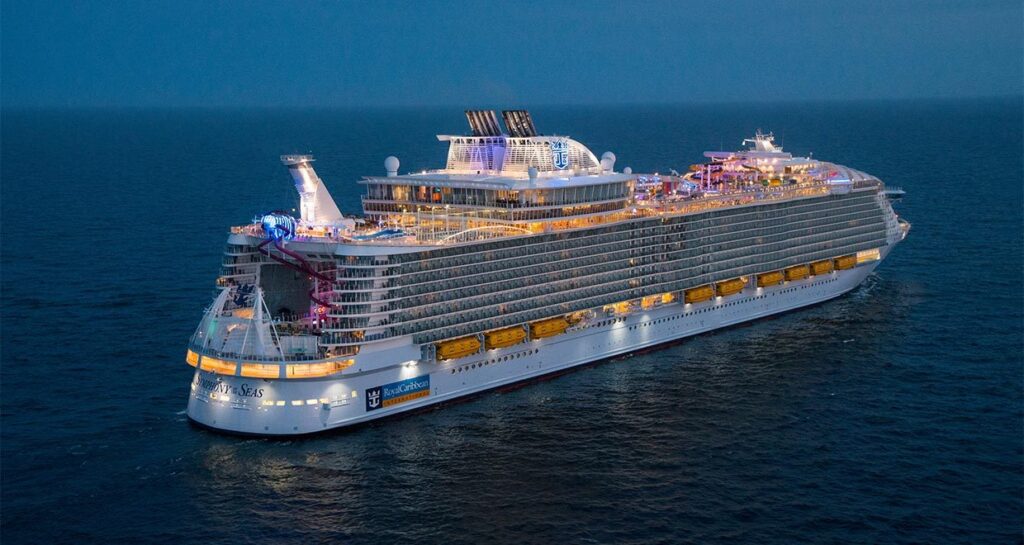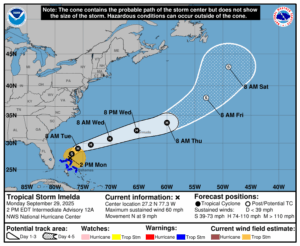
Guests on board Royal Caribbean’s Symphony of the Seas will be going someplace noticeably colder than the tropical Bahamas they were expecting. Due to strengthening Tropical Storm Imelda, the cruise line decided to reroute its Port Liberty, New Jersey cruise that was scheduled to visit Port Canaveral, Florida, Nassau, Bahamas, and the cruise line’s own private island, Coco Cay. Instead of heading to warmer weather, the cruise line decided to route the ship north to Nova Scotia, with newly scheduled stops in Halifax and Sydney instead.
The ship left New Jersey yesterday and is due to arrive in Sydney, Nova Scotia tomorrow morning and will stay there through Wednesday. On Friday, the ship will head to Halifax, Nova Scotia and spend the day there before returning to New Jersey.
In an email sent to guests on the ill fated cruise ship, Royal Caribbean wrote, “These storms’ forecast tracks make it hard to provide you with a safe and comfortable journey toward Florida and areas south. After exploring all of our options, we’ve decided to sail to Sydney and Halifax, Nova Scotia instead.”
Due to the dramatic shift in itinerary, Royal Caribbean is providing onboard credit depending on the type of cabin guests are booked in. The credit starts at $75 for those in interior cabins, grows to $100 for ocean view or balcony cabins, and gets as high as $200 per suites. In addition to those on board credits, Royal Caribbean says guests will also receive a future cruise credit prorated to the value of one day of their cruise fare paid. This credit can be used on any Royal Caribbean sailing that departs on or before September 28, 2026.
The center of Tropical Storm Imelda passed to the east of Royal Caribbean’s Coco Cay today.
We reached out to Royal Caribbean’s Chief Meteorologist Craig Setzer to see if there’s specific criteria used to cancel cruises to Coco Cay.
“It is a bit ship dependent, but we always make sure we can do so safely first, and not only for the ship but also for the guests walking to and from the island,” Setzer told us.

According to the National Hurricane Center, Tropical Storm continues to move north of the Bahamas at this hour. The storm is currently located about 55 miles north of Great Abaco Island and about 220 miles east-southeast of Cape Canaveral, Florida. Maximum sustained winds are up to 60 mph and minimum central pressure is down to 988 mb or 29.18″.
A Tropical Storm Warning is in effect for portions of the Northwestern Bahamas, including Eleuthera, the Abacos, Grand Bahama Island and the surrounding keys. A Tropical Storm Warning means that tropical storm conditions are expected somewhere within the warning area in this case within 12 hours.
Bermuda may be next in line to see a direct hit from the strengthening tropical cyclone. The National Hurricane Center said today, “Interests in Bermuda should monitor the progress of Imelda. Hurricane watches could be required for the island as soon as this afternoon.”
Imelda is moving toward the north near 9 mph and the National Hurricane Center says a general northward motion is expected to continue today. On Tuesday, Imelda is expected to turn sharply to the east-northeast. On the forecast track, the center of the system is expected to start moving away from the northwestern Bahamas this afternoon and then turn east northeastward, moving away from the southeastern U.S. but approach the island of Bermuda by the middle part of this week. Additional strengthening is forecasted over the next several days, and Imelda is forecast to become a hurricane on Tuesday.
While the Royal Caribbean cruise will miss Imelda’s rain and wind, it may be subject to the wave action as the distant storm stirs up much of the western Atlantic along with Hurricane Humberto.
Cruise passengers in Nova Scotia will enjoy fair conditions but much colder temperatures. Daytime highs in Sydney will be in the upper 50’s while overnight lows will be in the low 40’s. In Halifax, it should warm up to the low to mid 60’s after morning lows near 40. These temperatures are in stark contrast to forecast highs in the Bahamas, where highs are in the mid 80’s and overnight lows are in the high 70’s.